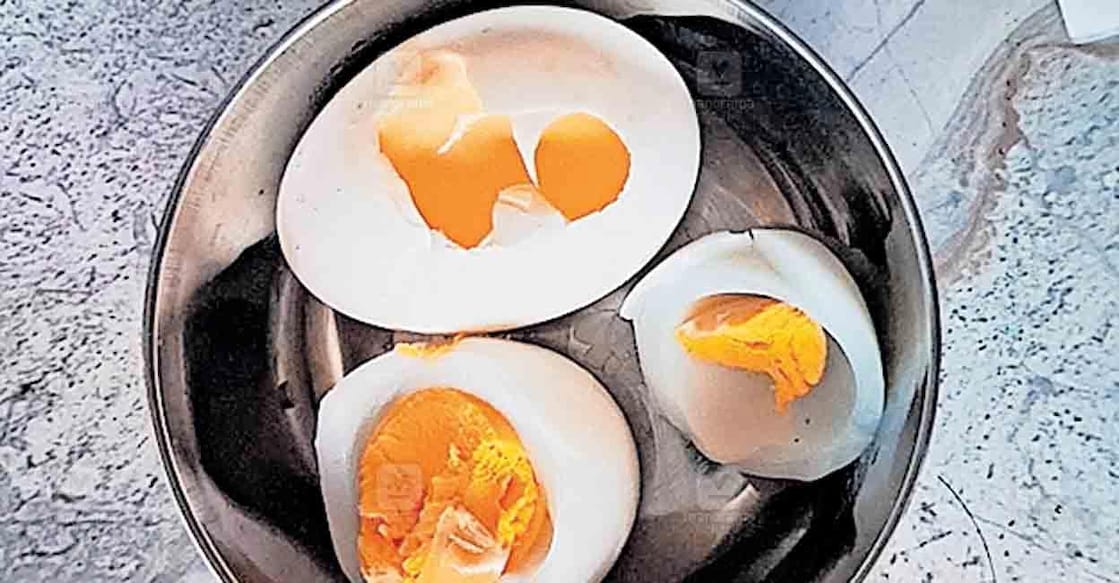Jelly-like yolks and rubbery whites: Strange eggs raise concern in Kerala’s Wayanad

Mail This Article
Residents of two villages in Kerala's Wayanad recently got more than they bargained for when they bought duck eggs from two-wheeler vendors reportedly from Tamil Nadu. At home, what looked like ordinary eggs turned into a shock: some released jelly-like liquid instead of a proper yolk, while others set into a rubbery mass. One even bounced like a ball when dropped.
Some eggs had a jelly-like consistency. Others turned rubbery after boiling. One even bounced like a ball when dropped, according to those who bought them. Many of these eggs reportedly refused to crack even when knocked together or dropped.
The eggs were sold at a bargain: 11 for just ₹100. The sellers, believed to be from Tamil Nadu, arrived on two-wheelers and offered the eggs directly to households and through small roadside stalls in the Kaniyambetta and Millumukku areas. The low price drew plenty of interest, especially among families who regularly use duck eggs in cooking.
It was only after the eggs were taken home and cracked open that buyers noticed something was off. Instead of a runny yolk, some eggs contained a thick yellowish liquid that darkened in colour over time. In a few cases, people who boiled the eggs reported peeling back the shell to find a white, rubber-ball-like substance inside.
Suspecting serious quality issues, some residents have set aside the eggs and plan to report the matter to local health officials for investigation.

What could cause this kind of egg behaviour?
There’s no official confirmation yet, but experts say such abnormalities are more likely due to poor quality or mishandling than anything more sinister.
Over the years, social media has stirred fear about “plastic” or “fake” eggs entering Indian markets. But those claims have been widely dismissed by food safety departments. In fact, during a similar scare in 2017, Kerala officials confirmed that there was no evidence of synthetic or artificial eggs being sold in the state.
In reality, there are simpler, and far more common, reasons behind strange egg textures:
- Eggs stored too long without refrigeration can spoil and change texture
- Transporting eggs in high summer heat can cause internal breakdown
- Poor nutrition or hygiene in poultry farms may lead to eggs with weak shells or strange contents
- Overcooked or poorly cooled boiled eggs can sometimes turn rubbery

Can eggs really become jelly-like or rubbery?
Yes — and it usually comes down to spoilage or temperature abuse.
When eggs are kept in the wrong conditions, proteins can break down, moisture can shift, and what’s left inside the shell may not behave like a normal yolk or white. In some cases, the yolk becomes thick and gluey. In others, boiling may cause it to harden unevenly or form a bouncy rubber-like core.
None of this is safe to consume.
How to check egg freshness and avoid spoiled ones
To stay safe and avoid using compromised eggs, keep these tips in mind:
- Buy only from trusted sources – avoid eggs sold from unlabelled vehicles or roadside stalls at suspiciously low prices
- Perform a water test – fresh eggs sink; older ones float or stand upright
- Inspect the shell – thin, cracked or overly smooth shells could signal spoilage
- Check after cracking – if it smells off or looks gelatinous, don’t use it
- Cook thoroughly – proper cooking reduces the risk of illness from borderline eggs.

